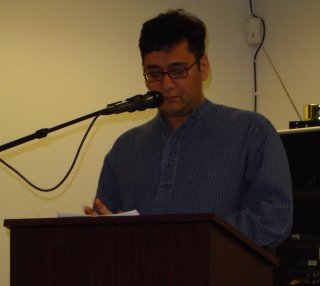There seems to be a slow, steadily-building rumble of response from the mainstream American Muslim community to the Progressive Muslims, both the leaders of the
Progressive Muslim Union and just the identity of "Progressive Muslim".
And
most, distressing is that people I have always had great respect for as elders are, in my
very humble opinion, going to a place that is akin to ... let me not go too far and say it seems to me that they are throwing the baby out with the bathwater.
In one case, I have seen a respected member of the community call the Progressive Muslims "Neo-Con Muslims". That bears some analysis. At one level, it almost seems like a pre-emptive strike—against people like me, who have been known to refer to the mainstream of American Muslims, dominated as it is by the 20th century innovations of Syed Koteb and Maududi, as people who follow "a new way of being conservative" or, in other words, the Muslim equivalent of "neo-cons".
The other, more literal angle, of course, is to see which Muslims fit the definition of "neo-con" as it is usually used in mainstream American politics. The "neo-cons" are usually former liberals who have since come to support a very muscular foreign policy and found a home in the Republican party. Which brings us to
Irshad Manji, a liberal (on the issues--homosexuality, etc.--she's a flaming liberal, right?) who seems to have thrown her lot in with a muscular (US) foreign policy and support for the Likudnik view of the world. [See:
http://www.npr.org/templates/story/story.php?storyId=4516893]
I, at least, have not seen ANY of the Progressive Muslim crowd go anywhere near close to that point of view. (The PMUNA did flirt with inviting
Fareed Zakaria and the "
Muslims for Bush" crowd to the organization, but I don't think it was because of any agreement on the Iraq issue or anything else—in fact, it might have been exactly for the same reasons some folks are taking on the Progressives—a wish to develop and maintain unity of the community under all circumstances.)
Another critique of the American Muslim point of view comes from the editor of the
American Muslim Perspective. See:
http://www.amperspective.com/html/pragmatic_muslims.htmlAs someone who really does not come out of the progressive, leftist, socialist, or secular tradition, but from a traditional Muslim background, and in all respect and affection, for I consider these folks my elders, my question is this:
Forget the progressives, for a second. If we, people like me, are genuinely uncomfortable with about 80-98% of the ideological, political and theological content that dominates the mosques of Muslim America (and I would gladly list chapter and verse), what do we do? Do I bite the bullet and send my 5-year old to a Sunday School that will teach him 6 pillars of Islam (by counting Jihad) when I was brought up with a Hadith that lists 5?
Please, I would love an answer to that question. Again, I am not a socialist, progressive, leftist, secularist, or atheist. I come from a religious sunni tradition, but one that is not Maududist.
Please.
فی سبیل اﷲ and جزاک اﷲ in advance.
[That translates, in American, to approximately "Please, for the sake of God" and "Thank you, God bless you for that".]

